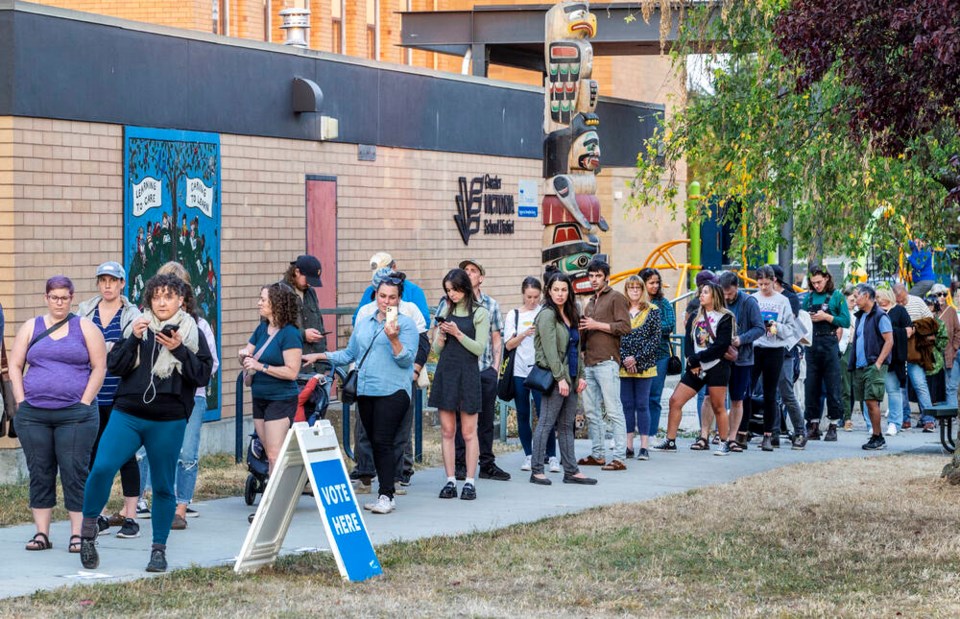Dear victorious election candidates, congratulations!
Also, YOUR AN IDIOT!!!
Sorry, I just wanted to be the first to deliver the latter message, misspelled, IN CAPITAL LETTERS and with multiple exclamation points to show how dangerously unhinged I have become. Given the toxic, self-righteous indignation that has infected the land in recent times, exacerbated by the fear, anxiety and dust bunnies associated with spending 2 1/2 years hiding under our beds trying not to die from the plague, you just know it’s a snarling, spittle-stained sentiment you’ll be hearing regularly over the next four years. From your mother, among others.
Or perhaps not.
Maybe, just maybe, we could use this moment as an opportunity to start again, hitting the reset button when it comes to public discourse, polarization and the notion that every issue from housing, bike lanes, police funding and the erection of picnic tables at Clover Point has to be viewed through an ideological lens and fought like the Battle of Gettysburg, one side pitched against the other in a bloody social-media war. Maybe, just maybe, we could turn down the heat under a pot that always seems to be boiling. (“Everybody’s so angry,” we tell each other as we reload.)
Victoria council wades into this with an almost blank canvas. Marianne Alto will be mayor, but Ben Isitt, the only incumbent to run for re-election as a councillor, and a frequent target of some of that spittle-tainted snarling, appeared headed for defeat Saturday night. The newness of the council presents both a challenge (never mind the workings of city hall, the rookies don’t even know where the washrooms are) and an opportunity for a fresh start. (Though the newcomers would be wise to listen to Chris Coleman, a six-term councillor who appeared to be headed back to the table after taking the last term off; he is vocal about the need for good governance, not bad politics.)
Shockingly, Langford council finds itself in a similar position. The seemingly unassailable Stew Young and his long-serving supporters on council were ousted en masse by a slate that wants to turn ÎÚÑ»´«Ã½’s fastest-growing municipality in a new direction. Only Lillian Szpak, who had butted heads with Young, remains from the old council. She’ll have a lot of rope-showing to do.
Let’s be real. Alto will still be a lightning rod, because that comes with being Victoria mayor. Still, she might have an easier time than second-place finisher Stephen Andrew would have Two years ago, Andrew was voted onto city council in a pandemic-delayed byelection triggered by Together Victoria councillor Laurel Collins’ departure for federal politics. When he won, it was as a counterweight to the ideological flavour that Together Victoria, Isitt and one or two others had brought to city hall. Having been cast in that role, it was hard to rebrand. Alto, while coming from the left, wasn’t so starkly defined.
And note that Victoria’s new council won’t have an official political slate in the mix. The Vancouver Island Voters Association, much-villified by the city’s progressives, failed to make a dent Saturday. The left-tilting Together Victoria wasn’t on the ballot at all (though many of Saturday’s newcomers have the latter group’s leanings). The absence of labels will please those who equate slates with firing salvos from fixed positions.
Now, these won’t be an easy four years for any local official. One of the most noticeable things about this election was that the issues that had voters most worked up, the ones they want their councillors to act on, are outside of municipal jurisdiction. Housing and health care belong mostly to the provincial and federal governments. Ditto for the so-called catch-and-release bail rules being blamed for a surge in violent, random attacks on the streets. Municipal governments usually devote their small slice of the tax pie to local roads, recreation, police, fire, things like that — but pity the foolish local official who tells the voter “sorry that you don’t have a family physician, but we have a pickleball court to build.” Call it mission creep or call it filling the void, many municipal councils find themselves up to their necks in these issues now, making the job even harder.
But it won’t be quite as hard if the temperature isn’t so high.



